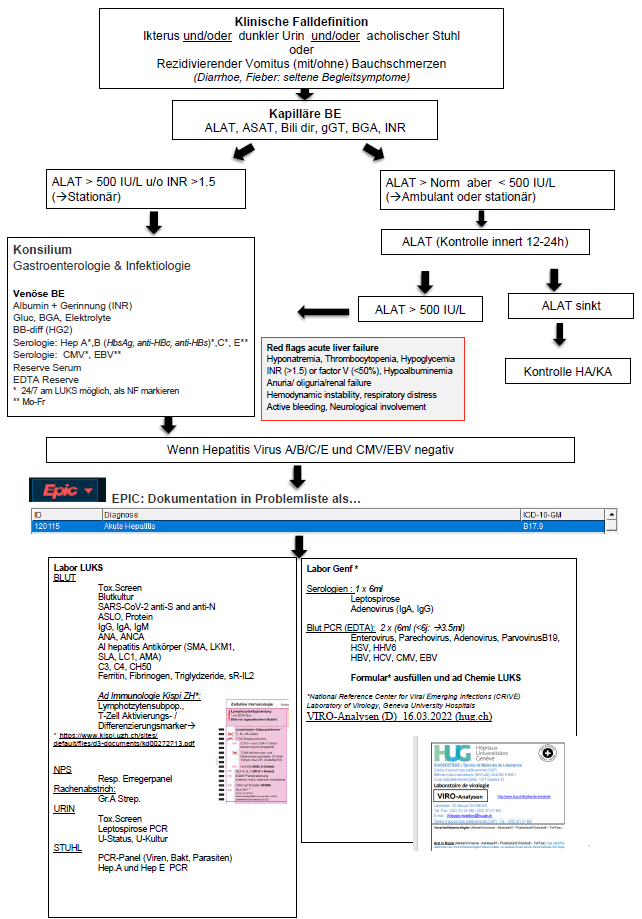Unklare akute Hepatitis (non-A/B/C/E Hepatitis Virus Hepatitis)
15.07.22 - akt. Version
Autor: M: Büttcher (Päd. Infektiologie), F. Righini (Päd. Gastroenterologie), K. Wechselberger (INS), N. Ritz (Päd. Infektiologie)
Version: Stand 11.07.2022
Hintergrund
Am 05.04.2022 benachrichtigte das Vereinigte Königreich (UK) die WHO über 10 Fälle von schwerer akuter Hepatitis unbekannter Ätiologie (non A-E Hepatitis) in Schottland bei zuvor gesunden Kindern unter 10 Jahren. Im April wurden über 100 Fälle berichtet aus UK, den USA, Spanien und Holland1,2. Bisher berichtete Symptome/Zeichen sind Ikterus, Bauchschmerzen, Nausea, reduzierter AZ, Durchfall, Vomitus selten mit Fieber3,4.
Websites:
- https://asm.org/Articles/2022/May/Investigating-Acute-Hepatitis-of-Unknown-Origin-in
- https://www.ecdc.europa.eu/en/news-events/update-hepatitis-unknown-origin-children
- https://www.ecdc.europa.eu/sites/default/files/documents/RRA-20220420-218-erratum.pdf
- https://www.cdc.gov/ncird/investigation/hepatitis-unknown-cause/updates.html
- https://www.who.int/emergencies/disease-outbreak-news/item/DON-389
Die Ursache ist im Augenblick ungeklärt, es gibt folgende Hypothesen:
- A cofactor is causing normally mild adenovirus infections to be more severe or is causing them to trigger a severe immune response in children. These cofactors (according to the ECDC) may include:
Patient susceptibility (for example, due to a lack of prior exposure to adenoviruses during the pandemic); a prior infection with SARS-CoV-2 or another infection; a coinfection with SARS-CoV-2 or another infection; a toxin, drug or environmental exposure. - A novel variant adenovirus, with, or without, a contribution from a cofactor as listed above.
- A drug, toxin or environmental exposure.
- A novel pathogen, either acting alone, or as a coinfection.
- A new variant of SARS-CoV-2.
Die Erkrankung/Hospitalisation wird auch seit 1.7. 2022 in der SPSU meldepflichtig :
https://www.spsu.ch/en/docs/currentstudies
Am Kinderspital des LUKS schlagen wir deshalb bis auf Weiteres eine grosszügige initiale Abklärung vor:
Algorithmus
ALGORITHMUS (.PDF)

Quellen
1. https://www.who.int/emergencies/disease-outbreak-news/item/2022-DON376
4. Marsh Kimberly, Tayler Rachel, Pollock Louisa, et al. Investigation into cases of hepatitis of unknown aetiology among young children, Scotland, 1 January 2022 to 12 April 2022. Euro Surveill. 2022;27(15):pii=2200318.
